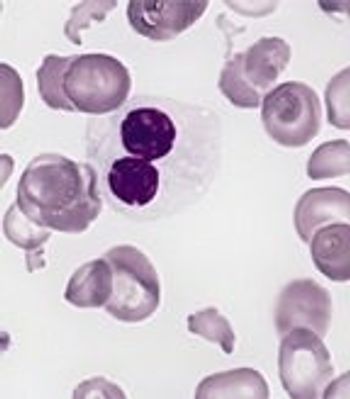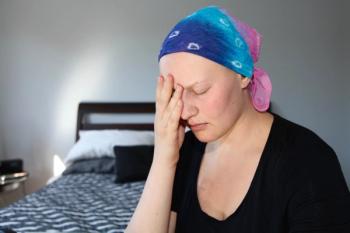
The FDA approved the use of nivolumab plus ipilimumab given with 2 cycles of platinum-doublet chemotherapy as a first-line treatment for adult patients with metastatic or recurrent non-small cell lung cancer.

Your AI-Trained Oncology Knowledge Connection!


The FDA approved the use of nivolumab plus ipilimumab given with 2 cycles of platinum-doublet chemotherapy as a first-line treatment for adult patients with metastatic or recurrent non-small cell lung cancer.

Gallbladder cancer rates were found to be low and similar among both patients with and without gallbladder polyps, according to a recent study.

Families of dying adolescents were found to have a poor understanding of their adolescent’s values in terms of their own end-of-life care.

The FDA granted fast track designation for CLR 131 in lymphoplasmacytic lymphoma/Waldenstrom’s macroglobulinemia in patients having received 2 prior treatment regimens or more.

Clinically important increases in melanoma risk in patients treated with biologic therapy for common inflammatory diseases cannot yet be ruled out based on current evidence.

Researchers found that patients with metastatic pancreatic cancer who had germline or somatic mutations in DNA repair genes had better clinical outcomes after platinum-based chemotherapy.

Patients with pretreated microsatellite instability-high cancers treated with immune checkpoint inhibitors were found to have high activity, independent of tumor type and drug used.

This study suggested that Medicaid expansion could have survival benefits for men with non-small cell lung cancer, however the same association pattern was not observed for women.

A phase II study indicated that low-dose erlotinib (Tarceva) appears to be safe and effective in elderly or frail patients with EGFR mutation-positive non-small cell lung cancer.

A workshop group assessed the use of multidimensional data obtained from patients with cancer and the computational methods used to analyze the data.

Recommendations for patients who develop COVID-19 while receiving immunotherapy or other advanced immune-engaging therapies.

Given these findings, researchers indicated that continuous education around molecular testing in lung cancer should be intensified on both national and international levels to ensure patients receive optimal therapy.

The lymphoma and myeloma expert indicated that one of the key ways to address these disparities in lymphoma and myeloma is to improve minority and rural accrual in clinical trials.

This study found that regional- and distant-stage prostate cancer incidence continues to increase in US men aged ≥50 years.

The American Society for Radiation Oncology recently conducted an online survey of 222 US based, practicing radiation oncologists, finding that 100% continued to provide radiation therapy services during the COVID-19 pandemic.

This phase II trial suggested that combination immune checkpoint inhibition with durvalumab plus tremelimumab may be associated with prolonged overall survival in patients with advanced refractory colorectal cancer.

Researchers highlighted the current challenges, risks, and future implications for global oncology trial management as a result of the COVID-19 pandemic.

The FDA approved olaparib for the treatment of adult patients with deleterious or suspected deleterious germline or somatic homologous recombination repair gene-mutated metastatic castration-resistant prostate cancer.

The associate professor of Medicine spoke about the use of of telemedicine in genetic counseling before the COVID-19 pandemic, how it is used today, and how telemedicine may be utilized in this space moving forward.

This study found that a biweekly unidirectional text-messaging intervention did not reduce aromatase inhibitor adherence failure in women with breast cancer.

Ambereen K. Mehta, MD, MPH, and Thomas J. Smith, MD, highlighted the necessity for palliative care services for patients with cancer to continue amidst the COVID-19 pandemic.

Atezolizumab was approved as a first-line treatment for adults with metastatic non-small cell lung cancer whose tumors have high PD-L1 expression, as determined by an FDA approved test, with no EGFR or ALK genomic tumor aberrations.

Recent findings suggested that watching Disney movies during chemotherapy treatment may be correlated with improvements in quality of life in patients with gynecologic cancers.

This study indicated that pediatric patients with cancer may not be more vulnerable than other children to infection or morbidity resulting from SARS-CoV-2.

The hematologist and medical oncologist discussed the approval of daratumumab and hyaluronidase-fihj for use in adult patients with newly diagnosed or relapsed/refractory multiple myeloma.

An international working group of experts in myelodysplastic syndromes proposed the recognition of the SF3B1 variant as a distinct nosologic entity based on the presence of a non-inheritable genetic mutation that causes the disease.

An analysis of women in Sweden found that mammography screening reduces the rate of advanced and fatal breast cancers, regardless of changes in treatment regimens.

This trial found that olanzapine may help patients with advanced cancer successfully manage nausea and vomiting unrelated to chemotherapy.

Insulin resistance was found to be 1 factor that contributes to the worse prognosis in breast cancer between black and white women, potentially through direct effects of insulin on the tumor insulin receptor.

Ripretinib is now indicated for adult patients with advanced gastrointestinal stromal tumor who have received prior treatment with 3 or more kinase inhibitor therapies.